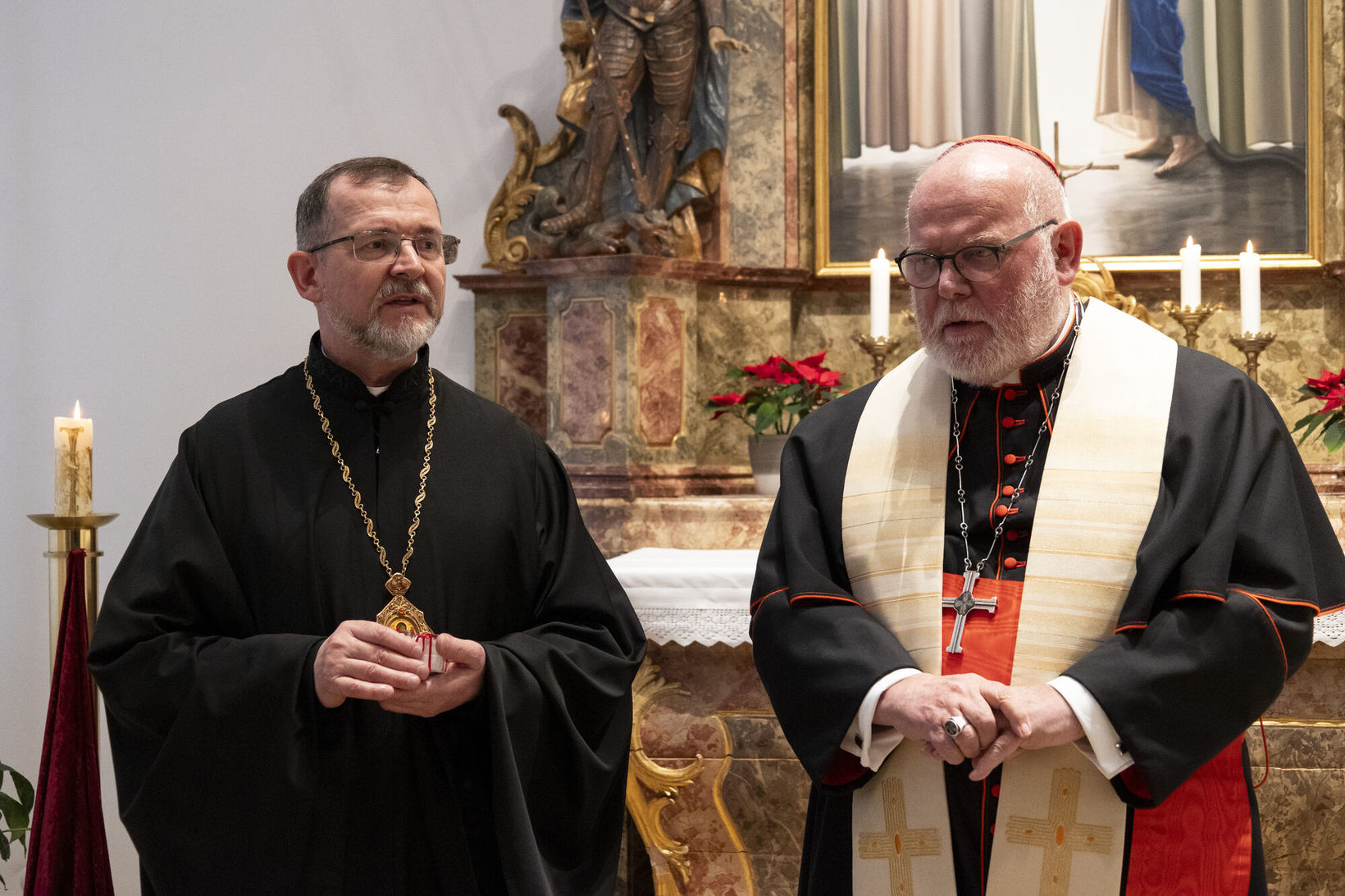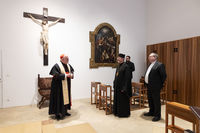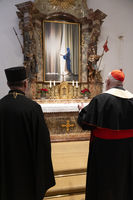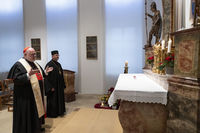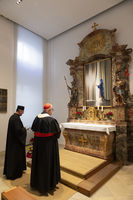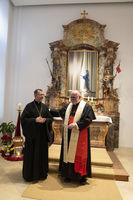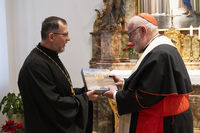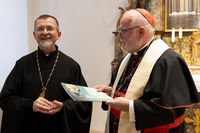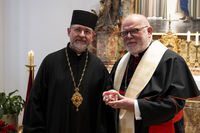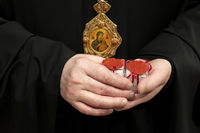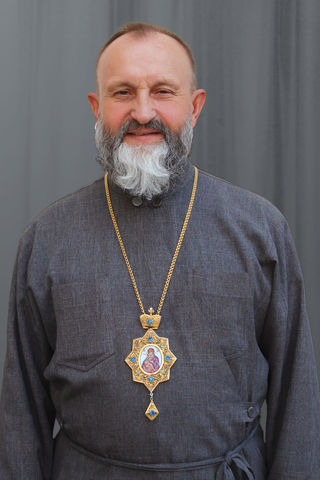Bishop Bohdan Dzyurakh Receives Relics of Blessed Edigna for Veneration in UGCC
On January 21, 2025, Cardinal Reinhard Marx, Archbishop of Munich and Freising, transferred a relic of Blessed Edigna, the great-granddaughter of St. Volodymyr the Great and granddaughter of Yaroslav the Wise, to Bishop Bohdan Dzyurakh, Apostolic Exarch for Ukrainians of the Byzantine Rite in Germany and Scandinavia.
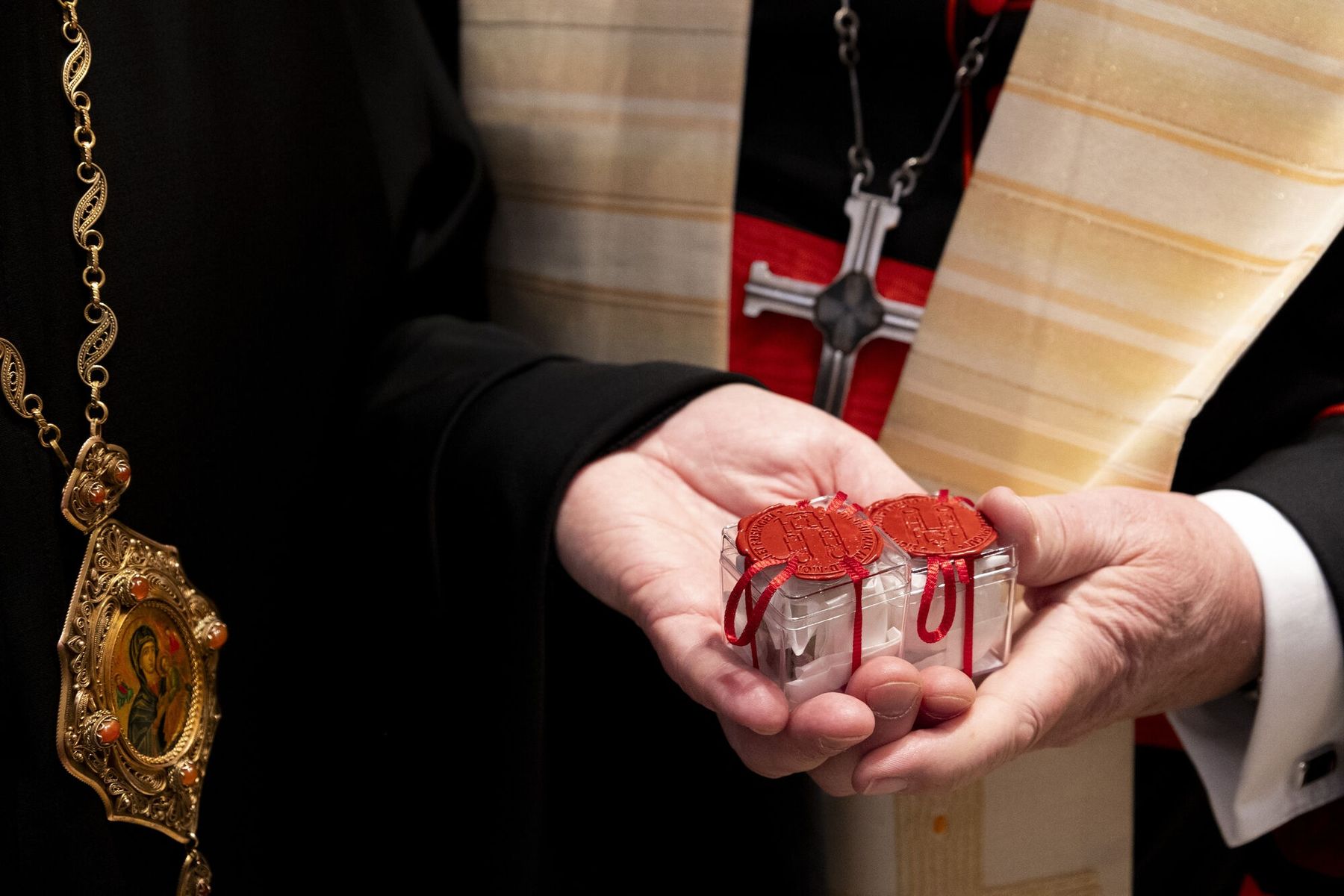
The relics, which are enshrined in the Bavarian church of St. Sebastian in Pouch, will now be placed in the UGCC Cathedral Church of the Intercession of the Blessed Virgin Mary in Munich and the UGCC Patriarchal Cathedral of the Resurrection of Christ in Kyiv.
This was reported by the press service of the Apostolic Exarchate in Germany and Scandinavia.
The solemn event began with a prayer led by Cardinal Marx, during which Bishop Bohdan sang a hymn in Ukrainian dedicated to Blessed Edigna.
“We pray for a just peace to be granted to the suffering Ukrainian people,” said the Archbishop of Munich. “Blessed Edigna, intercede for Ukrainians in this difficult time and help deepen the bond of friendship between Ukraine and Germany. Great God of peace, be with us and strengthen us by your power through your Son, the Lord Jesus Christ.”
Bishop Bohdan expressed his gratitude to the cardinal, saying: “Today brings a deeply moving moment for all of us, especially for Ukrainians living in this hospitable Bavarian land. This act of transferring the holy relics of Blessed Edigna is yet another testament to our spiritual unity and the close collaboration in serving God and His people. Blessed Edigna, whose relics we receive from your hands today, reminds us that the ties between the Ukrainian Church and the Ukrainian people with Europe, particularly Germany, extend not for decades but stretch back over a thousand years.”
He also thanked the head of the Diocese of Munich and Freising for his unwavering support and solidarity with Ukrainians. “Here in Munich, the Catholic Church truly breathes with both lungs, and we, Ukrainians of the Byzantine Rite, feel like members of a united Catholic family. For the countless expressions of support, kindness, and solidarity, I extend to Your Eminence and your collaborators our deepest gratitude.”
Bishop Bohdan, who spearheaded the initiative to transfer the relics of Blessed Edigna to the UGCC, acknowledged the contributions of Fr. Peter Förster, an official of the Archdiocese of Munich and Freising, Dr. Johannes Modesto, Fr. Otto Geng, rector of St. Sebastian’s Church in Pouch, and the leadership of the Society of Blessed Edigna.
“At this time, when our people are enduring great hardships in their homeland, your solidarity and support are especially meaningful. They empower us to persevere on the path to full freedom and strengthen our hope, reminding us that we share not only a millennial history but also a future together. May Blessed Edigna, the Blessed Martyr Peter Vergun, and all the saints and righteous of our peoples and Churches accompany us on this journey toward a shared future through their heavenly intercession,” the Apostolic Exarch concluded.
Reference
Blessed Edigna is the great-granddaughter of the Holy and Equal-to-the-Apostles Prince Volodymyr the Great and the granddaughter of the ruler of Kievan Rus, Yaroslav the Wise. Her life story is a significant part of the history of Rus-Ukraine and unites three nations today: the Ukrainian nation, from which she originates; the French nation, where she was born; and the German nation, where she devoted most of her life.
Emma-Edigna was born in 1055 or 1058 in France. Her father was King Henry I of France, and her mother was Queen Anna Yaroslavna of Kyiv. This royal union was the result of the strategic dynastic policy of Anna’s father, Yaroslav the Wise. By forming matrimonial alliances for his children, Yaroslav fostered strong ties with many European states and dynasties.
From the seventeenth to the nineteenth century, numerous written accounts and oral traditions preserved stories of the blessed virgin Edigna’s life, her ministry, miracles performed through her intercession, and the deep veneration she received in Bavaria. These sources shaped the narrative of her life as it is known today: Edigna, of royal lineage, was the daughter of King Henry I of France (1031–1060) and Queen Anna Yaroslavna.
In fulfillment of her vow of virginity and out of love for her divine Bridegroom, Jesus Christ, Edigna chose voluntary exile. To avoid a forced marriage, she left the royal court and journeyed eastward. Her travels brought her to Bavaria, where a peasant with an ox-drawn cart carrying a rooster and a bell offered her passage.
Legend tells that as they passed near the town of Pouch, the oxen stopped, the rooster crowed, and the bell rang. Edigna interpreted this as a sign of divine providence and decided to settle there. She made her home in the hollow of a large linden tree (which still stands next to St. Sebastian’s Church) and lived there for 35 years, dedicating herself to prayer, vigils, purity, and fasting, following the example of Christ.
Even during her lifetime, Edigna was renowned for her virtues and righteousness and was deeply respected by the local population. She forsook her throne to follow Christ and served her neighbors by teaching them to read and write, healing their illnesses, and sharing her knowledge and faith. She relinquished royal privileges to seek heavenly treasures, becoming a source of solace and refuge for those in need.
To this day, Blessed Edigna remains a profound example of service, devotion to others, and fidelity to God. Tradition holds that after her earthly life ended on February 26, 1109, oil flowed from the linden tree where she had lived. However, it ceased when people attempted to exploit it for profit.
The UGCC Department for Information